Share
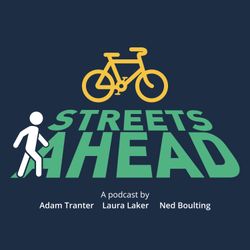
Streets Ahead
A podcast podcast dedicated to all things cycling, walking and wheeling, in the UK and beyond.
Latest episode
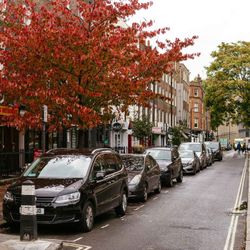
37. 2026: The Journey So Far
56:03||Season 2, Ep. 37This time Adam, Ned and Laura meet to discuss local elections and Ned's recent trip to India. Close to home, the trio discusses the phenomenon of the local being national. From Andy Street and Andy Burnham's successes as regional mayors, to a Court of Appeal ruling that removing LTNs by the Tower Hamlets mayor would be illegal, local politics shapes national politics.And with the political landscape more fractured than ever, active travel is on the political agenda again. The fractures caused by budget cuts can show up as U-turns on cycling and walking policy and sudden losses of confidence in local authorities in the face of public challenge. Can local authorities in the UK learn from politicians steps and missteps, and can campaigners help steel them for the road ahead? Ned's adventures in India: https://shows.acast.com/never-strays-far/episodes/never-strays-raj-a-cycling-passage-to-indiaLaura's Substack post on the Newham mayoral elections: https://substack.com/home/post/p-185413267And the news last month that Tower Hamlets mayor, Lutfur Rahman's bid to remove Low Traffic Neighbourhoods would be unlawful https://www.bbc.co.uk/news/articles/ce3kkven14no That clip of Zohran Mamdani fixing a bike lane on the Williamsburg Bridge: https://www.youtube.com/shorts/7F8ZVOfjS2oOne Telegraph columnist's recent take on 15-minutes cities as a 'Stalinist plot': https://www.telegraph.co.uk/gift/f337a3f300adace0And finally, if you want to ask Ned, Adam and Laura questions for a forthcoming episode, find us on social media or email us on streetsahead@fusion-media.co.uk.For ad-free listening, behind-the-scenes and bonus content and to help support the podcast - head to (https://www.patreon.com/StreetsAheadPodcast). We’ll even send you some stickers! We’re also on Bluesky and welcome your feedback on our episode: https://bsky.app/profile/podstreetsahead.bsky.social
More episodes
View all episodes
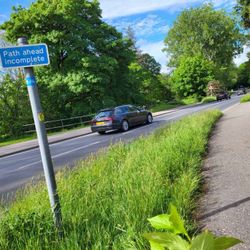
36. Outputs not outcomes (CWIS3)
52:09||Season 2, Ep. 36This time Ned, Adam and Laura talk targets - and why the third Cycling and Walking Investment Strategy (CWIS3) needs outputs, not simply outcomes. They are joined by the CEO of the Walk, Wheel, Cycle Trust (formerly Sustrans), Xavier Brice, who knows all about strategies, and delivering active transport networks.The government recently ended a consultation on CWIS3 but, frustratingly, the proposals lacked any investment or much strategy. There were no SMART targets, or any outputs, i.e. routes; simply the unachievable outcome that by 2035 walking, wheeling and cycling will be "a safe, easy and accessible option for everyone". Road Investment Strategies, by contrast, focus heavily on routes and infrastructure, so why do we treat walking, wheeling and cycling differently?Xavier Brice has been CEO of the Walk Wheel Cycle Trust since 2016. In 2007 Brice led the development of a new walking and cycling strategy for London, with Transport for London.This month Adam, Laura and Xavier Brice coordinated an open letter to the Secretary of State supporting a better CWIS3. That letter was signed by more than 50 organisations across health, active travel and beyond. It asked that central government maps a true national network of routes by 2030, and sets targets to deliver that network to a proper, accessible standard by 2050.You can read the letter here: https://bsky.app/profile/adamtranter.bsky.social/post/3m7fv3vhyks2rThe letter was covered in the Guardian by Peter Walker: https://www.theguardian.com/politics/2025/dec/12/drivers-cyclists-transport-policy-conservatives-culture-wars-road-safety Shortly after that, Walker interviewed transport minister, Lilian Greenwood, about the importance of 'creating a system that works for everyone': https://www.theguardian.com/politics/2025/dec/12/drivers-cyclists-transport-policy-conservatives-culture-wars-road-safetyLaura’s Freedom of Information requests to English local authorities found just 2 per cent had used legal powers to purchase land - something that's done routinely for roads https://substack.com/home/post/p-178788505And her article on CWIS3: https://lauralaker.substack.com/p/a-cycling-and-walking-strategy-walksThe Walk, Wheel Cycle Trust has been improving the National Cycle Network (NCN). In 2023/24 1.7km of an off-road muddy track connecting the residential area of Newton, in West Doncaster, to Danum retail park, was widened (on NCN62), with seven barriers removed or redesigned, along with improved wayfinding and signage. Estimated annual usage rose by 196% according to the Walk, Wheel Cycle Trust, from 150,000 trips in 2022 to 450,000 in 2024. Pedestrian and cycling trips increased by 191% and 192% respectively, while other users increased by 270%. Another path improvement project in Redcar and Cleveland saw ten barriers removed on NCN1 and NCN68. Wheelchair user trips increased four-fold, from 200 to 800, with 100% of disabled users saying they now use the route as the most convenient option.For ad-free listening, behind-the-scenes and bonus content and to help support the podcast - head to (https://www.patreon.com/StreetsAheadPodcast). We’ll even send you some stickers! We’re also on Bluesky and welcome your feedback on our episode: https://bsky.app/profile/podstreetsahead.bsky.social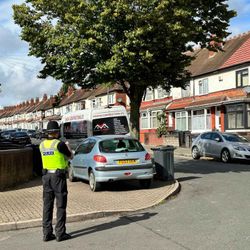
35. Pavement Parking: An Unhappy Fifth Birthday
49:23||Season 2, Ep. 35Last week marked five years since the previous government's pavement parking consultation ended and in that time, no action has been taken.Despite cross party, and public support, no decisions have been made by any of the intervening four prime ministers’ governments. In the meantime local authorities in Scotland began enforcing its pavement parking law, passed in 2019, with some success. There, drivers can be fined £100 for these parking behaviours; reduced to £50 if paid within 14 days.To discuss what went wrong in England, we have Tanya Braun, Living Streets’ Director of External Affairs and Fundraising. Living Streets has long campaigned to ban pavement parking; for decades, in fact - see March 2025's episode, interviewing veteran walking campaigner Terence Bendixson.Ned, Laura and Adam discuss with Tanya the way forward - and the impact of the hiatus on action, which hits very close to home for Ned.Living Streets has produced a map of ‘pavement parking hotspots’, which people can add problem locations to. More than 1500 people have added photos of vehicles left parked on pavements in a new campaign organised by the charity. Manchester and Oxford are among the worst offenders, with nearly 200 pins across Greater Manchester, they say. Their campaign is here: https://www.livingstreets.org.uk/get-involved/end-pavement-parking-in-england/ Those worst affected by pavement parking are people with disabilities - wheelchair users who might not be able to get past a parked vehicle, and those with visual impairments, who can’t see if it’s safe to step out into the road. People with children, buggies, mobility aids, elderly people, are just some of the vulnerable road users hampered by blocked pavements. Some people might choose not to leave their house. 21% of the population identify as having a disability For ad-free listening, behind-the-scenes and bonus content and to help support the podcast - head to (https://www.patreon.com/StreetsAheadPodcast). We’ll even send you some stickers! We’re also on Bluesky and welcome your feedback on our episode: https://bsky.app/profile/podstreetsahead.bsky.social
34. Lisbon’s Streets and the People Trying to Change Them
01:01:27||Season 2, Ep. 34Lisbon’s Streets and the People Trying to Change Them: Lisbon is one of Europe's most picturesque cities with a reputation for being a safe place to live, work and visit. That's true from one lens, but look deeper and you'll discover a city with one of the worst road safety records in Europe and recently rated one of the worst European cities for children’s urban mobility.This time, Adam and Laura were in Lisbon, Adam’s new home, to look into some of the transport challenges ahead of the upcoming mayoral elections. Portugal has one of western Europe's worst road safety records and its roads are at least twice as lethal as Spain's. Portuguese cities disproportionately feature in fatal collisions (57%) compared to the European average (38%).Ahead of Lisbon’s mayoral elections, there's a divide between the main candidates: the socialist party's (PS) Alexandra Leitão, who Streets Ahead interviewed, who rather ambitiously wants to eliminate all road traffic deaths in just five years, up against incumbent Carlos Moedas (PSD), on the right of centre. We also spoke to campaigners and those running for office, headlining road safety in their campaigns. Three quarters of Lisbon’s cycle network requires improvement, according to Portugal’s motoring association ACP: https://www.acp.pt/o-clube/revista-acp/noticias-do-clube/detalhe/mais-de-75-da-rede-ciclavel-de-lisboa-exige-melhorias Air pollution in Portugal has increased and the Court of Justice of the European Union ruled that the country failed to fulfil its obligations to tackle this https://eur-lex.europa.eu/legal-content/EN/TXT/PDF/?uri=CELEX:62022CJ0220.Some comparisons between Portugal and the rest of Europe in road collision injuries and death https://road-safety.transport.ec.europa.eu/document/download/489f6875-12a4-421a-93fd-eb05acc2f589_en?filename=erso-country-overview-2023-portugal_0.pdf In this episode, we spoke to:Alexandra Leitão, mayoral candidate https://viverlisboa2025.pt/ (Viver Coalition)Francisco Costa and Pedro Franco (Livre Party, part of Viver Coalition); local campaigners who want less traffic and slower speeds to improve pollution and safetyAnd Mário Alves, Secretary General, International Federation of Pedestrians; a leading member of MUBi, the Portuguese association for urban mobility; and a transport and mobility specialist.For ad-free listening, behind-the-scenes and bonus content and to help support the podcast - head to (https://www.patreon.com/StreetsAheadPodcast). We’ll even send you some stickers!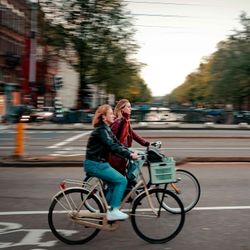
33. Women Leading the Way
01:02:56||Season 2, Ep. 33This time, Laura talks to four women, and one man inspired and backed by women, about the role of women in the world of cycling. Spanning three continents our interviewees tell us their stories. From improving adventure cycling access in Scandinavia to the need for better gender equity in the bicycle industry, via the role of women in advocacy in the USA, to women empowering women across Europe and Nepal, this is a globe-trotting pod.All of our interviewees Laura collared at the Velo-City conference in Gdansk in June. Show notes are below for each of them.Mark Ostrow from Seattle on expanding his efforts from creating one safe street to joining a citywide campaign, Seattle Neighbourhood Greenways. Mark credits advocate Cathy Tuttle, Senator Emily Alvarado, and legislator Julia Reed for backing him and his ideas. Seattle greenways aren’t what you’d think they might be…www.seattlegreenways.orgHenna Palosaari - Norway, cycle tourism expert, bike adventurer and content creator focusing on sustainable tourism and adventure marketing. Henna tells her story of the journey from novice bikepacker to advocate for mapping off-road adventure routes at a national level. https://www.velo-city-conference.com/en/programme/speakers/henna-palosaari/Carolina Cominotti - Barcelona, Spain. Citizen engagement officer at the European Institute of Innovation and Technology for Urban Mobility. Her project TandEM Women in Cycling https://engage.eiturbanmobility.eu/processes/tandemwomen?locale=en. Carolina talks of her work empowering women to cycle more and breaking down barriers to cycling access for women, from community to infrastructure and the life-changing power of this work.Anke Schȁffner - Chief Policy Officer for the German cycle industry Zweirad Industrie Verband (Bicycle Industry Association) speaks about the transformation of e-bikes' reputation and popularity in Germany, why bikes serve women so poorly and the untapped, and unmeasured, power of cycle tourism for the economy. https://www.ziv-zweirad.de/Anuradha Shrestha, an educator and advocate in Nepal, working with NGO Cycle City Network Nepal (CCNN) for the past decade, which trains women to cycle and to train other women. Anuradha speaks of the culture of celebration in Nepal and the need to train the trainers to maintain sustainable cycling growth - as well as the importance of community in fostering that growth. https://cyclecity.org.np/The book, Bikes and Bloomers, uncovers the Victorian women who invented clothing to cycle https://bikesandbloomers.com/book/More about the conference, which is held in Rimini, Italy, 16-19 June 2026 https://www.velo-city-conference.com/For ad-free listening, behind-the-scenes and bonus content and to help support the podcast - head to (https://www.patreon.com/StreetsAheadPodcast). We’ll even send you some stickers!
32. Global Insights from The Future Design of Streets
01:15:05||Season 2, Ep. 32In this episode, Adam takes you to Guimarães, Portugal, where he attended The Future Design of Streets conference, and came away seeing our streets in a whole new way.Streets aren't only about transport, of course. Importantly, they're about climate, equity, social life, and how we experience a city day-to-day.To explore this expanded view, we’ve put together four conversations with global thought-leaders shaping the future of our streets:Maria Vassilakou: The former Green Vice Mayor of Vienna, who led a decade of transformation in public space, mobility, and citizen participation. Under her leadership, Vienna became a model for affordable, accessible public transport.Demetrio Scopelliti: Architect and Director of Urban Planning and Public Space at Milan’s AMAT agency, working on the front lines of environmental and spatial transformation in one of Europe’s major cities.Agustina Martire: Architect, Reader at Queen’s University Belfast, specialised in the study of everyday streets, their fabric, histories and experiences, through the StreetSpace project. She is especially interested in the way people experience the built environment and how design can enable a more inclusive and just urban space.David Sim: Architect and author of Soft City: Building Density for Everyday Life. David brings a human-scale lens to urban design and planning. David talks about designing for comfort, connection, and how good cities make us feel.More about the conference: thefuturedesignofstreets.euFor ad-free listening, behind-the-scenes and bonus content and to help support the podcast - head to (https://www.patreon.com/StreetsAheadPodcast). We’ll even send you some stickers! We’re also on Bluesky and welcome your feedback on our episode: https://bsky.app/profile/podstreetsahead.bsky.social
31. Women Changing Cities
39:45||Season 2, Ep. 31In this episode, Laura chats to Melissa Bruntlett about her new book, Women Changing Cities: Global Stories of Urban Transformation.Melissa is an urbanist, author, and founder of Modacity, an urban mobility consultancy - and one half of urbanist power couple, Chris and Melissa Bruntlett. Melissa and Chris have authored two books to date, Building the Cycling City, and Curbing Traffic. Their social media posts from around the world feature positive examples of change, and inspiration for other cities and advocates. Originally from Canada, the couple have settled in the Netherlands, and often share experiential learning from one of the world’s greatest cycling nations. The book's narrative begins with pandemic street changes, and asks what was going on, beyond the public health emergency, that allowed the urban landscape to change? Why can cities do things differently at certain points in time, and how are women a part of that. The Bruntletts argue it's about listening and being humble, and taking that listening and humility with you into streetspace solutions. There are stories from leadership in Paris, Barcelona, Montreal and Bogota. There is also a grassroots angle, looking at a groundswell from young people in Manila, that spurred bike lanes in the city.The book: Women Changing Cities: Global Stories of Urban Transformation, by Melissa and Chris Bruntlett, is out in October 2025: https://www.ribabooks.com/Women-Changing-Cities-Global-stories-of-urban-transformation_9781915722409Melissa's project, Modacity Creative: https://modacitycreative.com/Melissa and Chris' work: https://www.modacitylife.com/For ad-free listening, behind-the-scenes and bonus content and to help support the podcast - head to (https://www.patreon.com/StreetsAheadPodcast). We’ll even send you some stickers! We’re also on Bluesky and welcome your feedback on our episode: https://bsky.app/profile/podstreetsahead.bsky.social